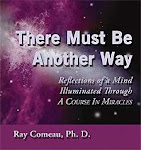One of the ways that we establish and maintain the illusion, the dream, is to give everything a name. Just think of how strongly we reinforce an infant’s first words, like, “Daddy,” “Mommy.”
Here is the first paragraph of Lesson 184, The Name of God is my inheritance.
You live by symbols. You have made up names
for everything you see. Each one becomes
a separate entity, identified
by its own name. By this you carve it out
of unity. By this you designate
its special attributes, and set it off
from other things by emphasizing space
surrounding it. This space you lay between
all things to which you give a different name;
all happenings in terms of place and time;
all bodies which are greeted by a name.
Henry Reed (1914-1986) wrote this remarkable poem, “Naming of Parts.” Here is the first stanza:
To-day we have naming of parts. Yesterday,
We had daily cleaning. And to-morrow morning,
We shall have what to do after firing. But to-day,
To-day we have naming of parts. Japonica
Glistens like coral in all of the neighboring gardens,
And to-day we have naming of parts.
Throughout his poem, Reed contrasts the naming and the training with the narrator’s mind shifting away , looking out the window.
Japonica glistens like coral in all the neighboring gardens
For me, the narrator is shifting his awareness from the body’s eyes, to Christ vision. This is an interval whereby he escapes the naming of parts, experiencing peace.
Thus what you need are intervals each day
in which the learning of the world becomes
a transitory phase; a prison house
from which you go into the sunlight and
forget the darkness. Here you understand
the Word, the Name which God has given you;
the one Identity which all things share;
the one acknowledgment of what is true.
And then step back to darkness, not because
you think it real, but only to proclaim
its unreality in terms which still
have meaning in the world that darkness rules.
Lesson 184.10
Now, Dear Reader, please enjoy reading the poem within this context.
NAMING OF PARTS
To-day we have naming of parts. Yesterday,
We had daily cleaning. And to-morrow morning,
We shall have what to do after firing. But to-day,
To-day we have naming of parts. Japonica
Glistens like coral in all of the neighboring gardens,
And to-day we have naming of parts.
This is the lower sling swivel. And this
Is the upper sling swivel, whose use you will see,
When you are given your slings. And this is the piling swivel
Which in your case you have not got. The branches
Hold in the gardens their silent, eloquent gestures,
Which in our case we have not got.
This is the safety-catch, which is always released
With an easy flick of the thumb. And please do not let me
See anyone using his finger. You can do it quite easy
If you have any strength in your thumb. The blossoms
Are fragile and motionless, never letting anyone see
Any of them using their finger.
And this you can see is the bolt. The purpose of this
Is to open the breech, as you see. We can slide it
Rapidly backwards and forwards: we call this
Easing the spring. And rapidly backwards and forwards
The early bees are assaulting and fumbling the flowers:
They call it easing the Spring.
They call it easing the Spring: it is perfectly easy
If you have any strength in your thumb: like the bolt,
And the breech, and the cocking-piece, and the point of balance,
Which in our case we have not got; and the almond-blossom
Silent in all of the gardens and the bees going backwards and forwards,
For to-day we have naming of parts.
It is perfectly easy to bring in the Spring, if we are in the right state of mind.
Monday, August 27, 2012
Subscribe to:
Post Comments (Atom)

No comments:
Post a Comment